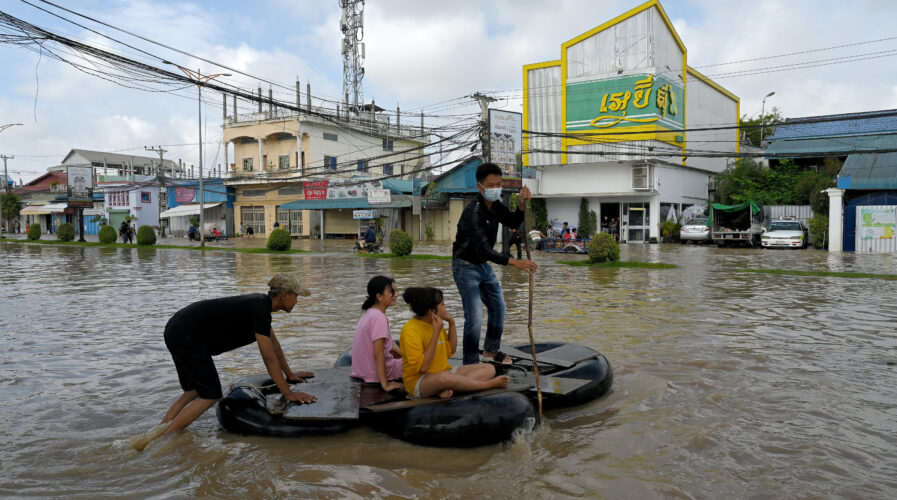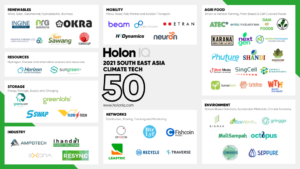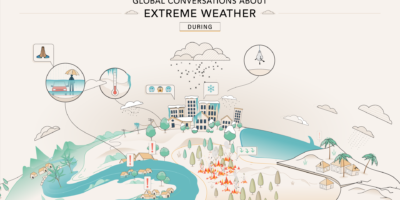
(Photo by TANG CHHIN Sothy / AFP)
Green dreams in SEA as HolonIQ debuts first-ever Climate Tech 50 list
As environmental issues continue to make headlines around the world, climate tech is becoming highly sought after by many sectors. In Southeast Asia, organizations are hoping to leverage climate tech to not only meet environmental regulations, but also to dramatically slash their carbon emissions.
Global impact intelligence platform, HolonIQ, collaborated with regional ecosystem leader New Energy Nexus to vet over 500 tech startups and companies headquartered in ASEAN, before selecting the top 50 most promising ones for the inaugural Southeast Asia Climate Tech 50 list. To determine who makes the cut, the scoring process will include market, product, team (including diversity), capital, and momentum.
The Southeast Asia Climate Tech 50 identifies the region’s young, fast-growing, and innovative climate-focused companies. Only companies less than ten years old, with few exceptions to that circumstance, were considered. A quarter (25%) of the cohort was first established in 2015, and 68% started between 2010 and 2014.
The 50 companies were categorized by their primary focus on the emerging taxonomy for climate tech. HolonIQ has built up an open-source taxonomy with experts from around the world. The Global Climate Technology Landscape 1.0 classifies 50 key categories, providing a standard structure and language for identifying, tracking and making sense of the breadth and depth of innovation happening in climate innovation globally.
 The ASEAN list is represented in eight categories this year. The categories are Agri+Food, Environment, Industry, Mobility, Networks, Renewables, Resources, and Storage. Nearly a third (32%) of the companies are in Agri+Food, including smart or vertical farming, plant-based, and cell-cultured food, environment, and renewables.
The ASEAN list is represented in eight categories this year. The categories are Agri+Food, Environment, Industry, Mobility, Networks, Renewables, Resources, and Storage. Nearly a third (32%) of the companies are in Agri+Food, including smart or vertical farming, plant-based, and cell-cultured food, environment, and renewables.
In addition, there is a strong presence in the Environment, with 16% of startups nvolved in providing nature-based solutions, sustainable materials, and a circular economy. Finally, the Renewables category drills down on wind, solar, geothermal, hydroelectric, and biomass energy sources, at 12%.
Most companies (58%) rely on physical forms of technology and innovation, with only 17% being software or digital-based. The remaining quarter provides climate-focused services. Some of the companies named in the 2021 Southeast Asia Climate Tech 50 are clean energy companies.
This comprises of :
- Ingine Pacific and Okra Solar in Vietnam and Cambodia.
- Blockchain-based seafood traceability and data ecosystem Fishcoin Project in Singapore.
- Waste management platform RecyGlo in Myanmar.
- Energy management solution Leastric in Indonesia.
- Sustainable plant-based meat alternatives producer WTH Foods in the Philippines.
- Turnkey provider of sustainable engineering solutions ihandal Energy Solutions in Malaysia.
- Clean energy electric vehicles developer ETRAN in Thailand.
The ASEAN list is part of the ten regional lists making up HolonIQ’s inaugural Climate Tech 1000. The selection was made from more than 20,000 startups and companies who applied or are covered by HolonIQ’s Intelligence Platform. The regional lists ensured a diverse and genuinely global representation, while highlighting the inspiring innovations happening worldwide.
The list showcased the most promising 1,000 making a substantial contribution to climate change mitigation or adaption by applying new technology or scientific knowledge. HolonIQ develops open-source taxonomies and proprietary intelligence to provide impact market intelligence so that better decisions can be made with contextualized data, disciplined analysis, and a global perspective across education, healthcare, and sustainability.
The Global Climate Technology Landscape 1.0 will be formally launched at the 26th UN Climate Change Conference of the Parties (COP26) that is set to take place from 31st October to 12th November 2021, in Scotland.
READ MORE
- Ethical AI: The renewed importance of safeguarding data and customer privacy in Generative AI applications
- How Japan balances AI-driven opportunities with cybersecurity needs
- Deploying SASE: Benchmarking your approach
- Insurance everywhere all at once: the digital transformation of the APAC insurance industry
- Google parent Alphabet eyes HubSpot: A potential acquisition shaping the future of CRM


